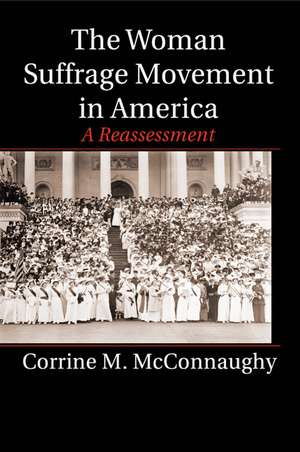The Woman Suffrage Movement in America: A Reassessment
Autor Corrine M. McConnaughyen Limba Engleză Paperback – 7 oct 2015
| Toate formatele și edițiile | Preț | Express |
|---|---|---|
| Paperback (1) | 204.66 lei 6-8 săpt. | |
| Cambridge University Press – 7 oct 2015 | 204.66 lei 6-8 săpt. | |
| Hardback (1) | 554.63 lei 6-8 săpt. | |
| Cambridge University Press – 13 oct 2013 | 554.63 lei 6-8 săpt. |
Preț: 204.66 lei
Nou
Puncte Express: 307
Preț estimativ în valută:
39.16€ • 41.11$ • 32.50£
39.16€ • 41.11$ • 32.50£
Carte tipărită la comandă
Livrare economică 10-24 aprilie
Preluare comenzi: 021 569.72.76
Specificații
ISBN-13: 9781107567054
ISBN-10: 110756705X
Pagini: 290
Ilustrații: 7 b/w illus. 1 map 30 tables
Dimensiuni: 152 x 229 x 15 mm
Greutate: 0.39 kg
Editura: Cambridge University Press
Colecția Cambridge University Press
Locul publicării:New York, United States
ISBN-10: 110756705X
Pagini: 290
Ilustrații: 7 b/w illus. 1 map 30 tables
Dimensiuni: 152 x 229 x 15 mm
Greutate: 0.39 kg
Editura: Cambridge University Press
Colecția Cambridge University Press
Locul publicării:New York, United States
Cuprins
1. Bringing politics back in: suffrage supply and demand; 2. Political meaning for woman suffrage; 3. Programmatic enfranchisement: coalitional strategies for voting rights; 4. Strong leverage: third party support; 5. Coalitional impossibilities: race, class, and failure; 6. The national story; 7. From the outside in.
Recenzii
'Rather than focusing on the activities and perspectives of women's rights activists, McConnaughy asks what strategic considerations might be involved in convincing legislators to expand the suffrage when such an expansion affects the probability of their own reelection. This book is an important contribution to the areas of gender and politics, race and politics, and social movements, and to our understanding of how policy is created.' Lee Ann Banaszak, Pennsylvania State University
'McConnaughy provides a compelling and innovative explanation of why some women were able to win voting rights in their states while others had to wait for the federal amendment. This historically rich volume reveals that when male voters, particularly union members and organized farmers, supported woman suffrage, male lawmakers were willing to do so as well. This work nicely complements studies centered on the suffragists themselves. McConnaughy shifts the focus to the neglected but pivotal role of male political actors in gaining votes for women.' Holly McCammon, Vanderbilt University
'This smart, discerning book provides new insight into an old story … In an account that goes beyond the usual focus on women's political activism, Corrine M. McConnaughy offers a refreshing take on a key set of puzzles about the timing and geography of the state suffrage efforts. Focusing on partisan dynamics within state legislatures she reveals that certain conditions, including the presence of third parties and higher levels of electoral competition, favored democratic expansion while others, including racial divisions and the desire to protect white voting rights, did not. This book not only makes an excellent contribution to our understanding of women's rights and American political development, but it is also a must-read for those seeking insight into the battles over voting rights occurring today.' Gretchen Ritter, Cornell University
'The strategic, partisan incentives of legislators drive Corrine McConnaughy's sophisticated, multimethod treatment of how, why, and when women won suffrage in the states prior to federal adoption. The book reorients suffrage scholarship with a supply-side, programmatic enfranchisement model focused on existing voters and the coalitions that suffragists forged within states. By establishing the partisan incentives that shaped state legislator decisions, McConnaughy contributes to current debates about parties and democracy. The book also offers a fresh perspective on how and why race shaped opportunities for suffrage success and failure in the states, and throws light on the role of party politics in the battle for the federal suffrage amendment.' Kira Sanbonmatsu, Senior Scholar, Center for American Women and Politics, and Professor of Political Science, Rutgers University
'McConnaughy is to be commended for addressing an important question, for rightly focusing attention on the state-level campaigns where so much of the suffrage fight was won and lost, and for articulating a nuanced and original theory to explain variation in suffrage success. [Her] explanation resolves puzzles left unanswered by previous research and is simultaneously theoretically sophisticated and based in a deep understanding of 'real' politics on the ground.' Christina Wolbrecht, University of Notre Dame
'[A] valuable addition to the literature on the woman suffrage movement.' Jill Frahm, H-SHGAPE
'McConnaughy's book adds a valuable insight into the complexities of the women's suffrage movement.' Shannon M. Risk, Political Science Quarterly
'McConnaughy provides a compelling and innovative explanation of why some women were able to win voting rights in their states while others had to wait for the federal amendment. This historically rich volume reveals that when male voters, particularly union members and organized farmers, supported woman suffrage, male lawmakers were willing to do so as well. This work nicely complements studies centered on the suffragists themselves. McConnaughy shifts the focus to the neglected but pivotal role of male political actors in gaining votes for women.' Holly McCammon, Vanderbilt University
'This smart, discerning book provides new insight into an old story … In an account that goes beyond the usual focus on women's political activism, Corrine M. McConnaughy offers a refreshing take on a key set of puzzles about the timing and geography of the state suffrage efforts. Focusing on partisan dynamics within state legislatures she reveals that certain conditions, including the presence of third parties and higher levels of electoral competition, favored democratic expansion while others, including racial divisions and the desire to protect white voting rights, did not. This book not only makes an excellent contribution to our understanding of women's rights and American political development, but it is also a must-read for those seeking insight into the battles over voting rights occurring today.' Gretchen Ritter, Cornell University
'The strategic, partisan incentives of legislators drive Corrine McConnaughy's sophisticated, multimethod treatment of how, why, and when women won suffrage in the states prior to federal adoption. The book reorients suffrage scholarship with a supply-side, programmatic enfranchisement model focused on existing voters and the coalitions that suffragists forged within states. By establishing the partisan incentives that shaped state legislator decisions, McConnaughy contributes to current debates about parties and democracy. The book also offers a fresh perspective on how and why race shaped opportunities for suffrage success and failure in the states, and throws light on the role of party politics in the battle for the federal suffrage amendment.' Kira Sanbonmatsu, Senior Scholar, Center for American Women and Politics, and Professor of Political Science, Rutgers University
'McConnaughy is to be commended for addressing an important question, for rightly focusing attention on the state-level campaigns where so much of the suffrage fight was won and lost, and for articulating a nuanced and original theory to explain variation in suffrage success. [Her] explanation resolves puzzles left unanswered by previous research and is simultaneously theoretically sophisticated and based in a deep understanding of 'real' politics on the ground.' Christina Wolbrecht, University of Notre Dame
'[A] valuable addition to the literature on the woman suffrage movement.' Jill Frahm, H-SHGAPE
'McConnaughy's book adds a valuable insight into the complexities of the women's suffrage movement.' Shannon M. Risk, Political Science Quarterly
Notă biografică
Descriere
This book tells the story of woman suffrage as one involving the diverse politics of women across the country.














